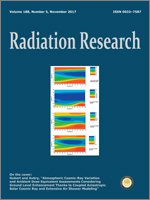The threat of exposure to ionizing radiation from a nuclear reactor accident or deliberate terrorist actions is a significant public health concern. The lung is particularly susceptible to radiation-induced injury from external sources or inhalation of radioactive particles from radioactive fallout. Radiation-induced lung disease can manifest with an acute radiation pneumonitis and/or delayed effects leading to pulmonary fibrosis. As prior warning of radiation exposure is unlikely, medical countermeasures (MCMs) to mitigate radiation-induced lung disease that can be given in mass-casualty situations many hours or days postirradiation are needed to prevent both early and late lung damage. In this study, KL4 surfactant (lucinactant) was evaluated as a radiation mitigator in a well-characterized mouse model of targeted thoracic radiation exposure, for its effect on both early (several weeks) and late (18 weeks) lung damage. Here, 120 mg/kg total phospholipid of KL4 surfactant was administered twice daily intranasally, (enabling intrapulmonary inhalation of drug) to C57BL/6 mice 24 h after a single 13.5 Gy dose of thoracic irradiation (LD50 dose). Both early and chronic phase (2 and 4 weeks and 18 weeks postirradiation, respectively) assessments were performed. Mice were evaluated for evidence of reduced arterial blood oxygenation and early and chronic lung and systemic inflammation, lung fibrosis and oxidative stress. Analysis was done by performing lung function/respiration dynamics and measuring cellular protein content of bronchoalveolar lavage fluid (BALF), and levels of cytokines, 8-iso-prostaglandin F2α, hydroxyproline in lung and plasma, along with evaluating lung histology. The results of this study showed that intranasal delivery of KL4 surfactant was able to preserve lung function as evidenced by adequate arterial oxygen saturation and reduced lung inflammation and oxidative stress; total white count and absolute neutrophil count was decreased in BALF, as were plasma pro-inflammatory cytokine levels and biomarker of oxidative stress. KL4 surfactant is a promising MCM for mitigation of lung tissue damage after targeted, thoracic irradiation and has the potential to be developed as a broad-spectrum, multi-use MCM against chemical, biological, radiological or nuclear threat agents with potential to cause lung injury.
How to translate text using browser tools
6 September 2017
Radiation Mitigating Properties of Intranasally Administered KL4 Surfactant in a Murine Model of Radiation-Induced Lung Damage
Melpo Christofidou-Solomidou,
Ralph A. Pietrofesa,
Evguenia Arguiri,
Constantinos Koumenis,
Robert Segal
ACCESS THE FULL ARTICLE

Radiation Research
Vol. 188 • No. 5
November 2017
Vol. 188 • No. 5
November 2017




